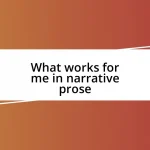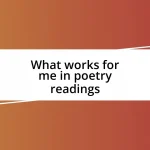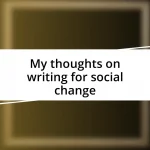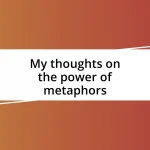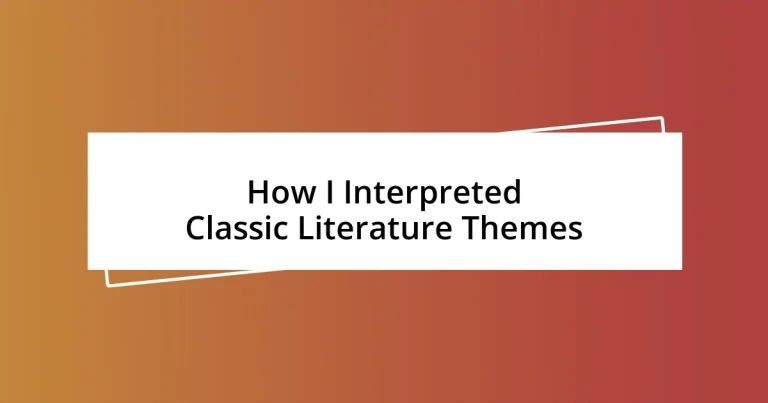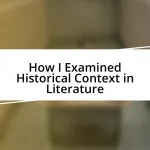Key takeaways:
- Classic literature explores timeless themes such as love, social class, and obsession, allowing readers to reflect on their own experiences and humanity.
- Analyzing character development reveals growth, flaws, and relatable struggles that resonate across generations, enriching personal understanding.
- Engaging with critical perspectives unveils deeper societal meanings and encourages reflection on contemporary issues, fostering a dynamic connection between literature and modern life.
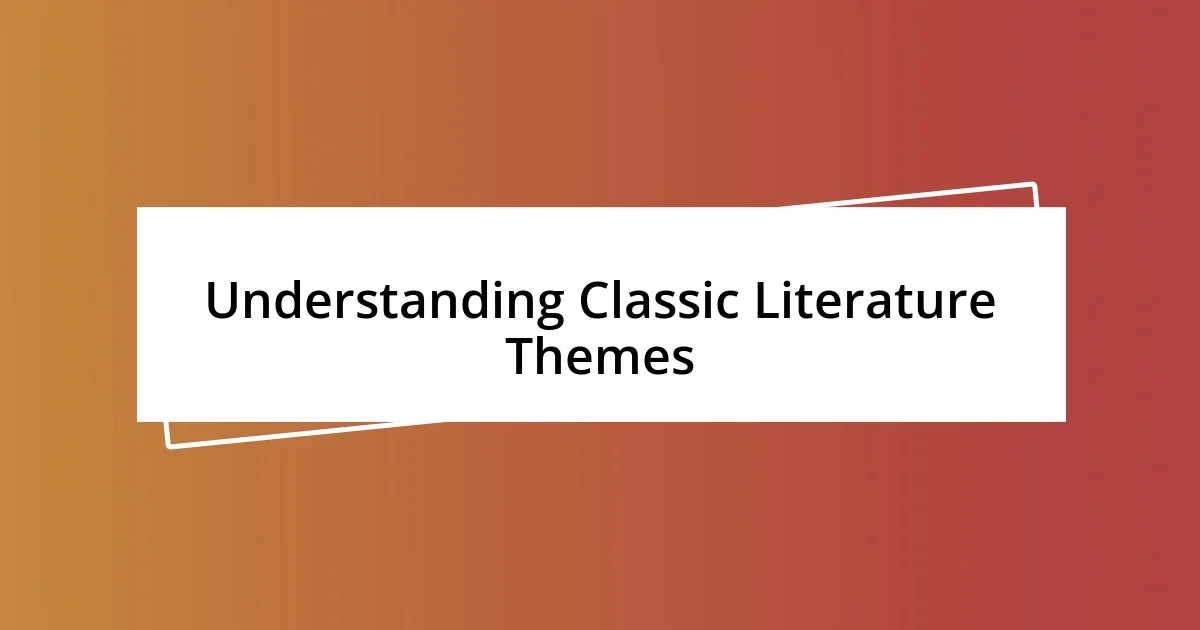
Understanding Classic Literature Themes
Understanding classic literature themes opens up a world of reflection and connection. I remember the first time I read “Pride and Prejudice”—the themes of love and social class struck a chord with me. Isn’t it fascinating how timeless these struggles feel, no matter the era?
Digging into these themes often reveals more than just surface narratives. For example, in “Moby Dick,” the obsession with vengeance stirs a sense of foreboding that resonated deeply with my own experiences of fixation. Have you ever felt consumed by a singular thought or goal? Classic literature encapsulates those emotions beautifully, inviting us to explore our own humanity.
As I delve into the layers of works like “The Great Gatsby,” I find myself pondering the elusive nature of the American Dream. It makes me question: what does success truly mean? The characters become mirrors, reflecting both our desires and our potential downfalls, creating a dialogue that adds depth to our understanding of life itself.
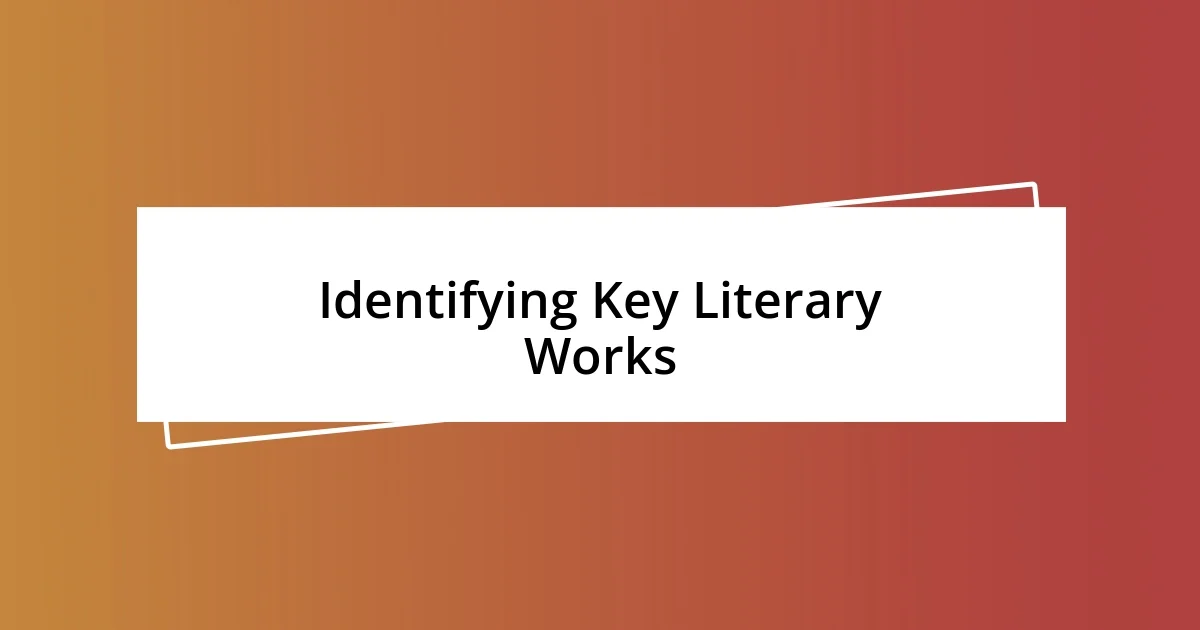
Identifying Key Literary Works
Identifying key literary works begins with recognizing those texts that have shaped our cultural landscape. I’ve often found that the classics, like “To Kill a Mockingbird” or “1984,” resonate with readers across generations. It’s intriguing how these narratives have lessons that remain relevant, prompting discussions on morality, society, and freedom.
For me, the experience of reading “Jane Eyre” was transformative. The themes of resilience and self-discovery struck a chord during my own journey of finding my place in the world. Have you ever immersed yourself in a character’s struggle and felt an inexplicable connection? It’s through such works that we identify common threads of human experience.
The exploration of key literary works isn’t just about their content; it’s about how they evoke emotions and provoke thoughts. When I revisit “Brave New World,” I often reflect on the implications of technology and conformity in our own lives. This level of introspection is a hallmark of great literature, allowing readers to connect deeply with their own realities.
| Literary Work | Key Themes |
|---|---|
| Pride and Prejudice | Love, Social Class |
| Moby Dick | Obsession, Revenge |
| The Great Gatsby | American Dream, Success |
| To Kill a Mockingbird | Morality, Justice |
| 1984 | Freedom, Surveillance |
| Jane Eyre | Resilience, Self-Discovery |
| Brave New World | Technology, Conformity |
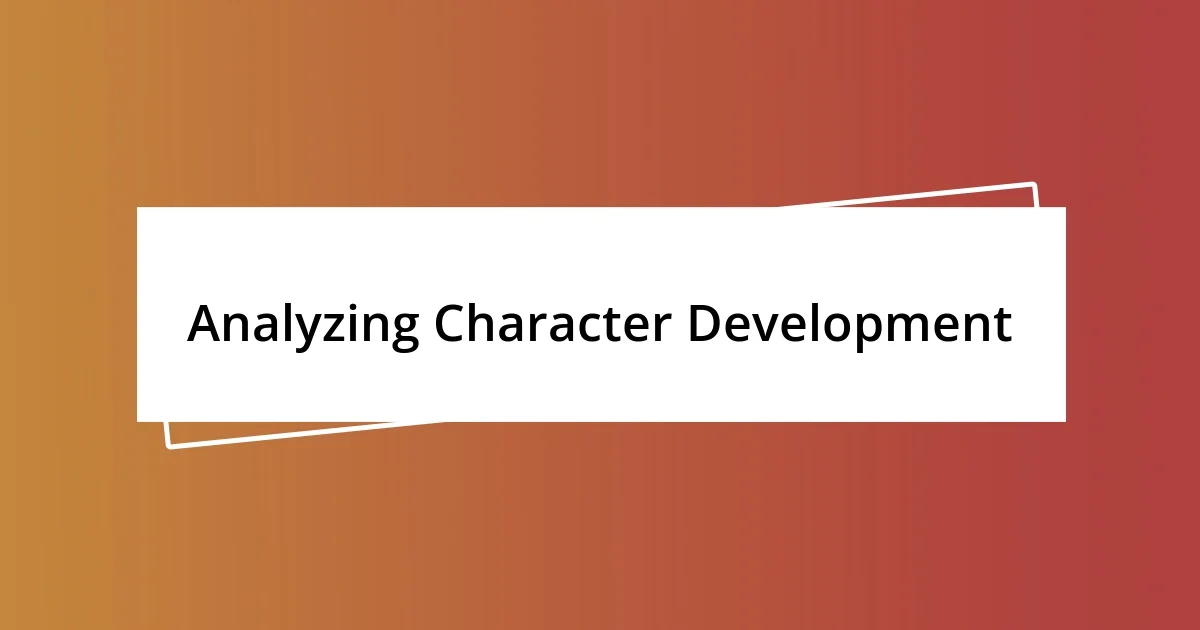
Analyzing Character Development
When I analyze character development in classic literature, I often see how deeply flawed and relatable these characters can be. Take Holden Caulfield from “The Catcher in the Rye,” for example. His journey through grief and alienation resonated with me during my own teenage years. I remember the feeling of disconnection, and I found solace in Holden’s honesty—a raw reflection of his inner turmoil.
- Characters like Elizabeth Bennet evolve significantly throughout their stories, showcasing growth through self-awareness.
- In contrast, some characters, like Jay Gatsby, remain tragically static, revealing the dangers of obsession and the illusion of success.
- Development isn’t just about change; it’s also about the choices characters make that reveal their true selves, offering powerful insights into human nature.
When I read about Anna Karenina’s fate, I felt a wave of empathy for her struggle against societal norms. Her development—fuelled by passion yet shadowed by despair—reminded me of the times I’ve grappled with my own choices. Each character’s arc invites me to reflect on my life experiences, making this analysis not just an academic exercise but a personal journey that enriches my understanding of what it means to be human.
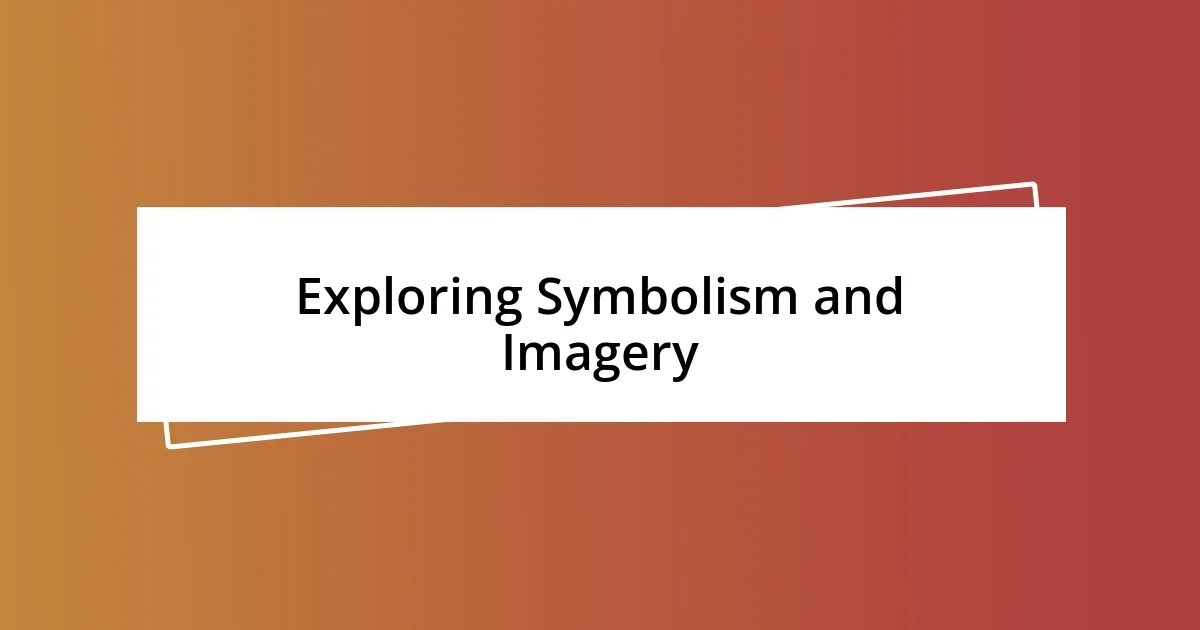
Exploring Symbolism and Imagery
Exploring symbolism and imagery in classic literature has always captivated me. For instance, in “The Great Gatsby,” the green light at the end of Daisy’s dock symbolizes Gatsby’s unattainable dreams. Remember when you first read about that shimmering light? It struck me as a powerful reminder of how our aspirations can sometimes feel just out of reach, no matter how hard we chase them.
Imagery can transport us to the vivid landscapes and intense emotions encapsulated in the texts. In “Moby Dick,” Melville’s description of the whale is not just about its physical presence; it embodies the relentless pursuit of obsession. I recall being swept away by the imagery, feeling the immense power of nature contrasted against human frailty. Have you ever found yourself caught up in such vivid descriptions that they linger in your mind long after reading?
Symbolism often reflects deeper societal themes, making literature a mirror for our own world. When I contemplated the conch shell in “Lord of the Flies,” it became clear to me how it represented order and civilization, which crumbled as the boys descended into chaos. It left me pondering: what symbols exist in our modern lives that signify our struggle for control? This exploration of symbol and imagery invites a dialogue between the text and my own experiences, linking the past with the present in a meaningful way.
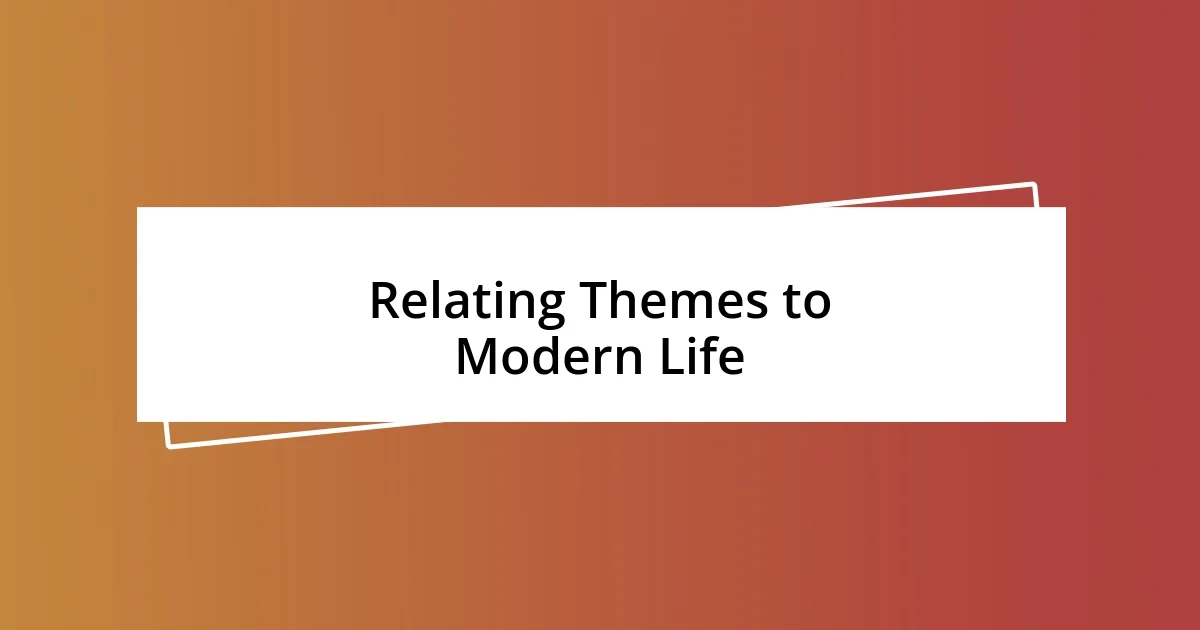
Relating Themes to Modern Life
Relating themes from classic literature to our modern lives reveals some fascinating connections. I once found myself struck by the theme of social class in “Pride and Prejudice.” The stark differences between Elizabeth and Darcy made me reflect on the social divides we still navigate today. Have you ever noticed how people are sometimes judged by their backgrounds rather than their character? It’s a reminder that, despite our progress, societal biases persist.
I often think about the theme of human resilience as depicted in “The Grapes of Wrath.” The Joad family’s struggle during the Great Depression resonates with the challenges people face today, especially during economic downturns or crises. I remember struggling through difficult times and finding strength in community support, much like the Joads did. These stories remind me of the enduring spirit in humanity, making me wonder: where do we find our resilience when times get tough?
Reflecting on themes like love and betrayal from “Othello” also hits home. The complexity of trust—how easily it can be broken—rings true in today’s fast-paced digital world, where relationships are often built and shattered online. I recall a friendship that ended abruptly due to miscommunication, echoing Othello’s tragic fate. It prompts me to ask: how can we learn from these timeless narratives to foster better communication in our modern interactions? These themes not only resonate with our experiences but also inspire growth and understanding in our lives.
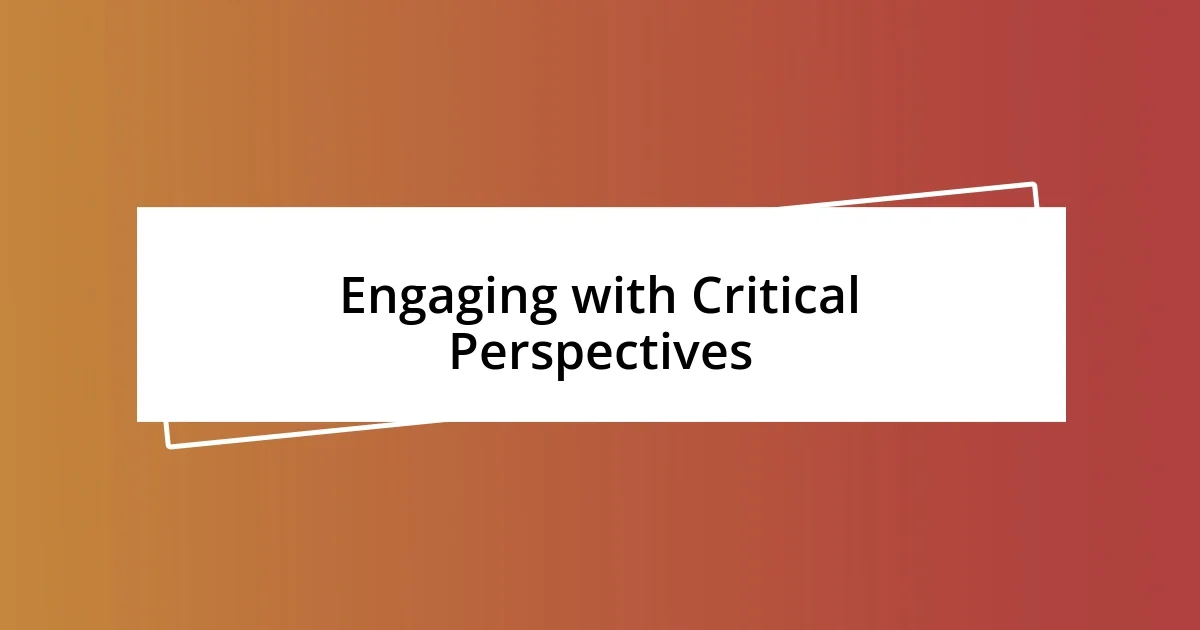
Engaging with Critical Perspectives
Engaging with critical perspectives in literature has opened my eyes to various interpretations that challenge my initial viewpoints. For instance, when I first encountered feminist readings of “Jane Eyre,” I was intrigued by the character of Bertha Mason. It made me reconsider how often we overlook marginalized voices in classic texts. Have you ever found a character you initially dismissed suddenly become pivotal to understanding the story’s deeper themes?
Diving into Marxist critiques of works like “A Tale of Two Cities” introduced me to the class struggle woven throughout the narrative. I remember feeling a wave of empathy for the plight of the lower class as Sydney Carton’s story unfolded. It prompts me to reflect: how relevant are Dickens’ themes of inequality in today’s societal structures? This perspective invites us to question our own implications within larger social systems.
Exploring historical and cultural contexts has allowed me to appreciate the layers of meaning in literature more profoundly. When I examined the significance of settings in “Wuthering Heights,” I found myself pondering how socio-economic factors shaped the characters’ destinies. I can vividly recall a discussion with friends about how our own backgrounds influence our choices and relationships. What if we delve deeper into our own narratives, drawing parallels that enrich both our understanding of the text and ourselves? Engaging with these critical perspectives reveals that literature is not simply a reflection of the past; it’s a dynamic conversation with the present.
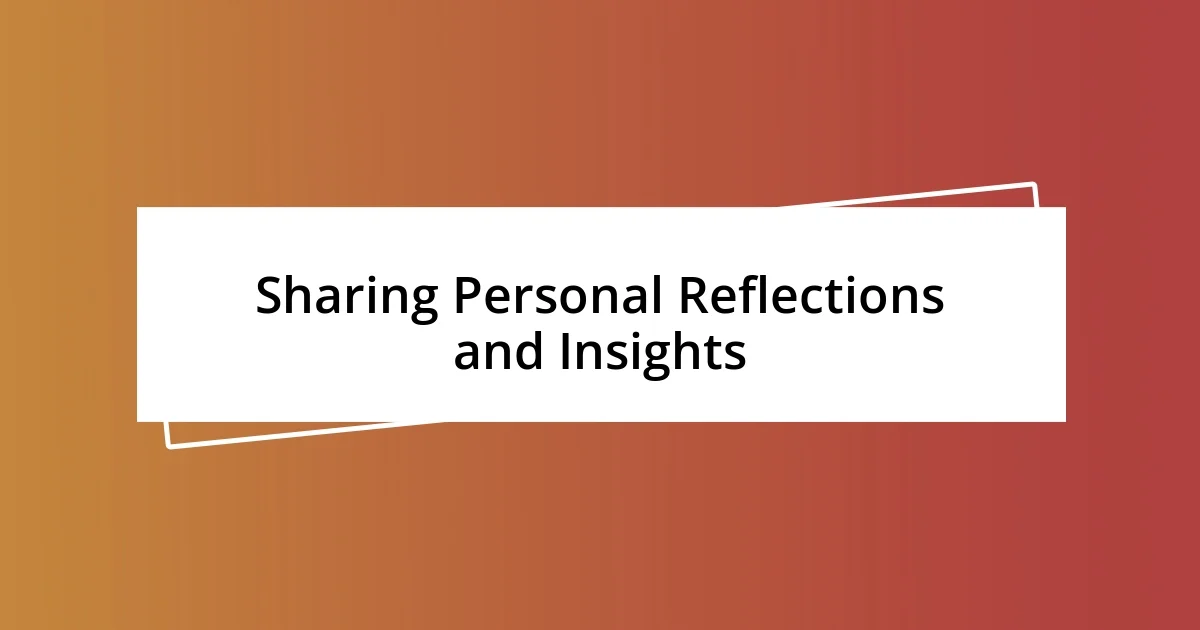
Sharing Personal Reflections and Insights
Reflecting on my personal experiences with classic literature allows a deeper understanding of the themes that resonate within. For example, I vividly remember a time during my college years when I read “The Great Gatsby” and was struck by Gatsby’s relentless pursuit of dreams. It reminded me of my own aspirations and the transient nature of success. How often do we chase ideals that seem just out of reach, only to realize they might not be what we truly need?
One of my more profound moments came while exploring the theme of isolation in “Frankenstein.” I found myself relating to Victor Frankenstein’s loneliness, having gone through a phase when I felt disconnected from friends and family while pursuing my goals. It led me to ponder: can ambition come at the cost of genuine relationships? This reflection prompted me to reach out and reconnect with those I had distanced myself from, finding that meaningful connections are often the real treasures we seek.
Another memorable insight occurred while I engaged with the theme of redemption in “Les Misérables.” As I read about Jean Valjean’s transformative journey, I couldn’t help but reflect on my own moments of regret and the power of forgiveness. It led me to ask myself, how can we cultivate compassion both for ourselves and others in our daily lives? This theme of redemption is timeless, highlighting that every day presents a new opportunity for change and growth.

